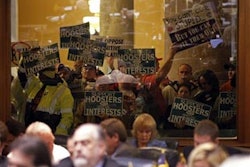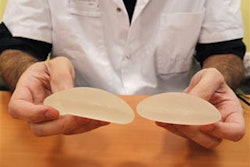MONTICELLO, Ky. (AP) — Kentucky's houseboat manufacturers once thrived by churning out luxurious floating residences, but the industry was nearly capsized by the economic downturn. Now it's dabbling in a new venture as it looks for a different course — the construction of moderately priced, energy efficient landlocked homes.
Houseboat maker Stardust Cruisers has built two relatively low-cost modular homes in a test that area residents hope will help revive the industry and bring back jobs to this struggling town on the edge of Appalachia.
Houseboat manufacturers clustered around one of Kentucky and Tennessee's most popular tourist areas — Lake Cumberland in southeastern Kentucky — have shed hundreds of jobs since the Great Recession dried up orders. The region produces more houseboats than any other area of the country, but plants have closed or cut back on employees in recent years, said Brady L. Kay, executive editor of Houseboat magazine.
"Ten years ago, there were quite a few in that one area," Kay said Friday, "but since this downturn, now that things have slown down significantly, we're seeing companies pull out."
During the heyday in the mid-2000s, area workers skilled as carpenters and electricians produced several hundred houseboats each year, Stardust's chief executive estimated. The companies shipped finished boats to Europe, Australia and the Middle East.
Now, production has shriveled to about 20 to 25 per year. The number of area manufacturers has dropped from a dozen to about four, and where once 1,000 people built houseboats, now that number is fewer than 200, said Stardust President and CEO Terry G. Aff.
That's deepened the impact of the recession in a place that proclaims itself the "houseboat manufacturing capital of the world" on a sign at the entrance of the town, population 6,000.
"People are looking for work, they're hungry for jobs," Monticello Mayor Jeffrey Edwards said Friday as federal, state and local officials gathered for a ceremony to mark the new home-building venture. He said two restaurants, a lumber yard and a discount store have also closed because of the recession.
Johnny Brummett II is among the local residents rooting for a comeback. Brummett, 34, worked for houseboatmakers for about seven years before moving out of state. Now he's back in town but the jobs have nearly evaporated at the houseboat plants.
He works at a local plant that makes military bags, but the pay is lower and his hours have been cut.
"I'm at the point in my life I want a career," he said. "I'm just tired of getting by."
Jobs are so coveted in this hardscrabble area that a local cabinet manufacturer was inundated with 600 to 700 job applicants recently when it put out word it was looking to fill 80 to 100 jobs.
"I've got a lot of friends trying to nickel and dime it, and just getting by," Brummett said.
There are no guarantees that modular homes will rescue the beleaguered industry.
For Stardust, at the forefront of the effort, it's a modest beginning.
The two model homes it built measure 1,000 square feet with two bedrooms and one bath each. The homes were built in two pieces at Stardust's plant. One was moved to Monticello and the other to nearby Whitley County.
Both are currently unoccupied, but prospective buyers are working to obtain financing.
The target price for the modular homes is about $100,000. Houseboats can range in price from $200,000 to more than $1.5 million.
Stardust, Kay said, caters to high-end clients, but retooling its manufacturing line to build the new houses instead of houseboats is another way to keep the business running and employees on the job.
"It's great for the area," he said. "It's just smart business."
The project has been backed by federal grants, and its proponents are hoping the venture expands to include construction of multifamily units and classrooms. The venture could be a boon to suppliers as well. Kentucky products accounted for more than 80 percent of the value of the two prototype homes built by Stardust.
Stardust has boosted its full-time work force in the past couple of years, and a few have focused on building the modular homes. Aff said that the process for building the boats and the landlocked homes is similar, so adding the new product didn't require many equipment changes. There has been some worker retraining.
"This project meets a multitude of needs in our region by putting families back to work, providing energy-efficient housing, increasing demand for Kentucky-made projects," said Republican U.S. Rep. Harold "Hal" Rogers, among the state and federal officials boosting the initiative.
The push for the project has come from the Kentucky Highlands Investment Corp., which works to boost economic development in a 22-county area of southeastern Kentucky. The project is a collaboration of Kentucky Highlands and the University of Kentucky's College of Design, which also worked with the Center for Applied Energy Research at the university.
One niche is the energy efficiency of the homes. The estimated energy costs at current rates are expected to be a paltry $1.65 per day.
Aff sees the landlocked homes as a way to diversify his operation, but said the company doesn't have any more orders for modular homes right now. More homes will be built once there are orders for them, he said.
"It's not something that we can afford to speculate on building," he said. "So we'll have to see how the market accepts them."
It takes about eight weeks to build each home, compared to four months to a year for a houseboat, he said.
As for prospects for the core business of building houseboats, Aff said there will always be a market for people wanting to live on the water, but he predicted the industry "will never be back to what it was."
___
Associated Press writer Janet Cappiello in Louisville, Ky., contributed to this report.


















